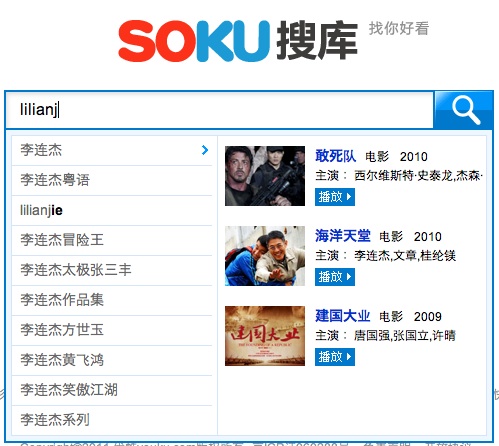Social networking may get all the rave but latest stats from comScore reveal Chinese Internet users actually spend the bulk of their time on portal sites (24.4 percent) followed by entertainment (9 percent) and search (6.2 percent) before social networking (5.5 percent).
Youku, China’s online video provider, led the category as the largest entertainment site with more than 19 percent reach of total unique visitors in Greater China and Baidu was ranked as the largest search property tapping more than 59 percent of web users.
If you look at search globally, Google rules and YouTube is the second largest search engine in the world, but YouTube was blocked in China starting in 2009.
So when it comes to video search in China, the key players would most likely be Baidu or Youku.
This becomes apparent when Youku launched its specialized video search engine Soku in May, that allows users to search for video files under its network as well as from 10 other video sites in China such as Tudou, Qiyi, Sohu, Sina, 56.com and joy.cn.
According to Youku’s PR Jean Shao, Soku is based on the video sharing site’s understanding of Chinese video viewer’s usage habits and not simply by traditional keyword relevance.
When you click on Soku’s home page, it has a clean user interface that features a TV shaped collage of thumbnails showcasing 100 of the most searched videos framing its search box. Each of the thumbnails links directly to the movie and these movies tend to be from North Asia such as Hong Kong, Korea, and Mainland China. You could also search from three key categories on its landing page – chart rankings, movies, or TV series.

Soku has another unique feature where you type in a partial input of a celebrity or director’s name and it will return a list of his or her recent movies in the Ku Box. You can then click on the thumbnail results inside the box that will bring you directly to view the movie.
As Soku is catered to Chinese users, its search results are more sensitive to Pinyin input (a way of transcribing Chinese characters into Roman alphabets) than for native English users. For instance, typing “Jet Li,” a famous martial arts actor from China, returns no results, but results start to appear on its KuBox when you type “Lilianjie,” his Chinese name as shown below.

Despite taking a year of beta testing before rolling Soku out, Shao said the video search engine’s focus is on user experience first and will consider offering advertising once it gets market recognition.
Meanwhile China’s search giant, Baidu has its own video search vertical called Baidu Video that indexes videos from a multitude of Chinese online video providers, including Youku, Tudou, Sohu, and others.
Additionally, Baidu is in a joint venture as a majority shareholder with Providence Equity Partners to launch Qiyi, a free high-definition network video service that features licensed, long-form video content such as TV dramas and movies.
But there’s a difference when searching on Baidu Video and Qiyi as queries on Baidu Video will turn up results of numerous online video sites that could include Qiyi if there’s matching content but searching on Qiyi will only return results from Qiyi itself, according to a Baidu spokesman.
In terms of ad opportunities, Baidu Video offers display ad formats as well as text ads sold in the same way as its paid search ads while Qiyi offers pre-roll that on average is 35 seconds long with one to three ads per video, as well as pause and display ads.
A little over a year since Qiyi launched in April 2010, it now has 156 million unique visitors a month.
With close to 340 million Chinese Internet users watching video online, according to iResearch, and browsing time close to 4 billion hours, Baidu.com also wants to be part of the game by incorporating video results on its main search page that directs its top results to Qiyi or alternatively allow Internet users to watch directly on the embedded PPTV player in its search results. A test search for Chinese TV series “Three Kingdoms” returned these results:

Looks like Baidu is determined to keep its users on its search engine or at least drive them to Qiyi, while Youku will need to raise Soku’s profile quickly to gain new users. Don’t be surprised if Tencent or other video players launch their own video search services in the near future.


